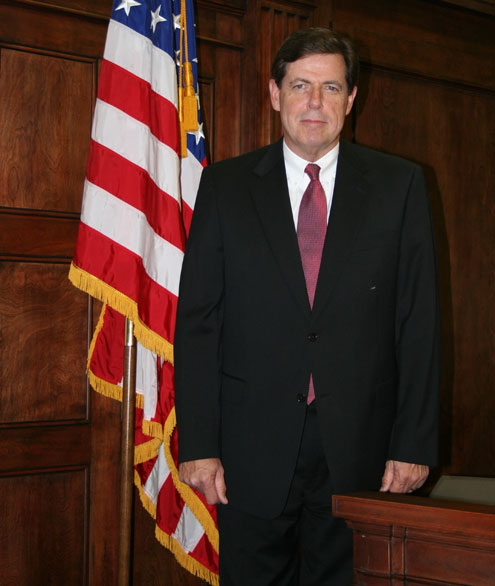DENTON (UNT), Texas — Between January 1995 and January 1996, 66 wolves from Canada were relocated to Yellowstone National Park and parts of Idaho, according to a U.S. Department of the Interior plan to repopulate the wolf species in those areas.
But in December 1997, William Downes, chief judge of the U.S. District Court for the District of Wyoming, declared the plan unlawful, ruling that putting the non-endangered Canadian wolves into those areas violated the Endangered Species Act.
The case was just one of the many high-profile cases that Downes, an alumnus of the University of North Texas, has presided over during his 15 years with the U.S. District Court for the District of Wyoming. Downes will return to his alma mater Sept. 16 (Wednesday) to give a free lecture as part of the university’s observance of Constitution Day.
The lecture, “The Constitution Then and Now: How the Document Stands the Test of Time” begins at 3:30 p.m. in the Silver Eagle Suite of UNT’s University Union, which is located one block west of Welch and West Prairie streets. A reception will follow.

A native of Hingham, Mass., Downes received his degree in political science from North Texas in 1968. He joined the U.S. Marine Corps with three fraternity brothers and served in the Vietnam War as an artillery officer.
He graduated from the University of Houston Law School in 1974 and moved to Green River, Wyo. — the hometown of a fraternity brother. He was in general practice before joining the firm of Brown & Drew in Casper, Wyo., in 1978 to practice civil litigation.
Downes was a managing partner of Brown & Drew when he was nominated to the U.S. District Court for the District of Wyoming by President Bill Clinton in 1994. Downes was sworn into the court on June 16, 1994, and became chief judge in 1999.
In addition to the Yellowstone wolves case, Downes presided over a lawsuit that claimed that banning rock climbers from Wyoming’s Devils Tower during the month that Native Americans hold religious ceremonies was an unconstitutional endorsement of religion. Downes dismissed the lawsuit and ruled in favor of the ban.
In 2001, Downes dismissed a civil suit against the Boulder, Colo., Police Department brought about by the first detective to respond to the JonBenét Ramsey kidnapping report in December 1996. The suit claimed a gag order imposed by the department didn’t allow the detective to defend herself against allegations that she “bungled” the criminal investigation of what became a homicide.
Downes is currently considering a case involving the death of three girls on Wyoming’s Wind River Indian Reservation. Members of the Wyoming Coalition for Open Government are asking the U.S. Attorney’s Office to release the cause of the deaths, though federal law and U.S. Department of Justice policy prohibit the release of information and records related to juvenile proceedings.
Constitution Day was created in 2004 with the passage of an amendment by U.S. Sen. Robert Byrd to an appropriations bill. The actual date of Constitution Day, Sept. 17, was previously known only as Citizenship Day, which was signed into law by President Harry S. Truman in 1952. The holiday recognized those who had become U.S. citizens during the previous year. While the expanded Constitution Day and Citizenship Day mandates that all publicly funded educational institutions provide educational programs on the history of the American constitution, the holiday does not give federal employees time off from work.